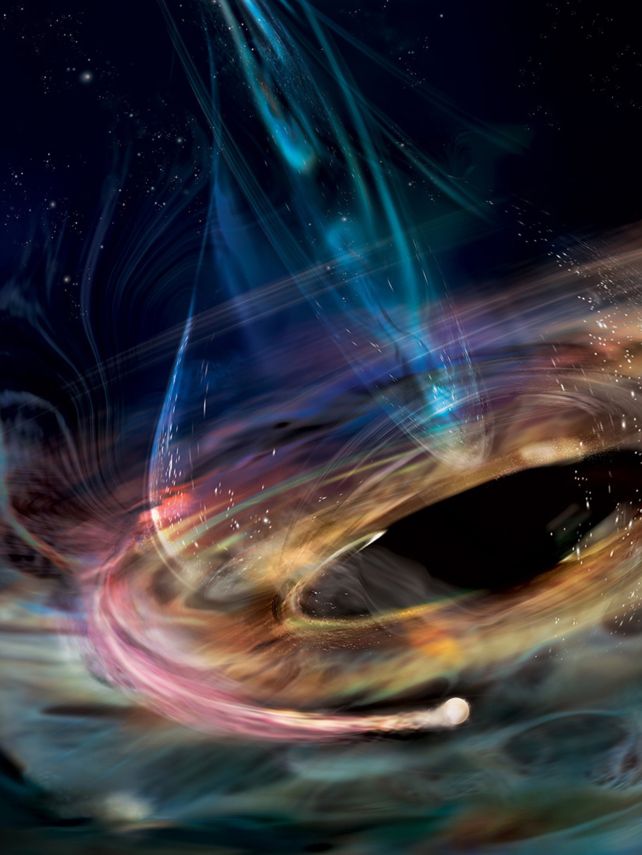Some 275 million light-years from the Milky Means lies a real cosmic thriller.
There, within the coronary heart of a galaxy named 1ES 1927+654, squats a supermassive black gap whose monkeyshines and hijinks have baffled astronomers for years.
Now, we’d lastly have a proof for not less than a few of its wild misbehavior: an orbiting white dwarf star veering precariously near the brink of the black gap’s occasion horizon, the purpose past which regardless of can ever return.
“This would be the closest thing that we know of around any black hole,” says physicist Megan Masterson of the Massachusetts Institute of Expertise. “This tells us that objects like white dwarfs may be able to live very close to an event horizon for a relatively extended period of time.”
Black holes themselves emit no mild, however the supermassive black holes on the facilities of galaxies are sometimes surrounded by enormous clouds of fabric. It is this materials, heated by friction and gravity because it swirls in orbit across the black gap, that blazes with mild.
When this mild adjustments, astronomers can research it to determine what occasions is likely to be happening within the black gap’s neighborhood. For instance, we all know what it seems to be like when a passing star will get caught in a black gap’s gravitational discipline and torn asunder to be devoured over time.
A comparatively modest beast clocking in at round 1 million occasions the mass of the Solar, the black gap on the heart of 1ES 1927+654 appeared comparatively regular till 2018, when its surrounding corona winked out of visibility earlier than regularly brightening to almost 20 occasions its earlier luminosity.
This was puzzling. One evaluation prompt that it is likely to be the results of a black gap polar reversal. Having by no means by no means seen something prefer it earlier than, scientists saved a watch on 1ES 1927+654 to see if the rest of be aware occurred.
In June 2022, one thing did.
X-ray knowledge recorded by the European Area Company’s XMM-Newton area telescope confirmed that the galactic nucleus had began fluctuating in brightness. The X-ray output of the black gap was various by about 10 %, on timescales of round 18 minutes.
This isn’t unheard-of black gap conduct. Such fluctuations are often called quasi-periodic oscillations, and their precise trigger or causes are unknown. However 1ES 1927+654 simply needed to make it even weirder. Over the course of two years, the time between the fluctuations narrowed from round 18 minutes to below seven.

“We’ve never seen this dramatic variability in the rate at which it’s flashing,” Masterson says. “This looked absolutely nothing like a normal black hole.”
So what within the Universe could possibly be happening? To determine that out, the researchers wanted to look at the clues: the wavelength of sunshine and the periodicity of the flickering.
“Seeing something in the X-rays is already telling you you’re pretty close to the black hole,” says physicist Erin Kara of MIT. “When you see variability on the timescale of minutes, that’s close to the event horizon, and the first thing your mind goes to is circular motion, and whether something could be orbiting around the black hole.”
The researchers ran by way of the out there eventualities and decided that the more than likely possibility is a dense object within the materials orbiting the black gap, regularly getting nearer. As its orbit shrinks, the time between flashes of sunshine as circles the black gap shortens. Meaning this object is whipping round an occasion horizon with a radius 4.2 occasions that of our Solar’s in simply seven minutes.
The staff’s calculations present that this object might be a white dwarf star; that’s, the collapsed core of a low-mass star that has ejected its outer materials because it died. The mass for this object is round 0.1 occasions the mass of the Solar, packed right into a sphere between the Earth and the Moon in diameter.
frameborder=”0″ allow=”accelerometer; autoplay; clipboard-write; encrypted-media; gyroscope; picture-in-picture; web-share” referrerpolicy=”strict-origin-when-cross-origin” allowfullscreen>
If that is so, the white dwarf might but survive the encounter. At such shut proximity, the black gap might be tearing off the white dwarf’s outer materials, which provides the tortured star sufficient kickback momentum to maintain it from passing the purpose of no return. White dwarfs are additionally actually dense, which might be preserving it from coming aside like a standard star would.
This might imply that it’s going to finally retreat away from the black gap to a safer distance. If the staff’s evaluation is appropriate, they’ll have the ability to observe this retreat in a lengthening interval within the X-ray oscillations. No matter occurs, although, this black gap is much from achieved instructing us about essentially the most excessive gravitational environments within the Universe.
“The one thing I’ve learned with this source is to never stop looking at it because it will probably teach us something new,” Masterson says. “The next step is just to keep our eyes open.”
The analysis has been introduced on the 245th assembly of the American Astronomical Society. It has additionally been accepted in Nature, and is out there on preprint server arXiv.

